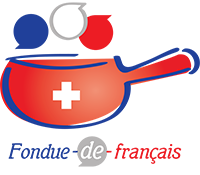This question deserves an article because many learners do not dare to ask their Swiss teacher for fear of upsetting him or her.
So, let’s be clear: in Switzerland, we teach French! Period.
I could stop there, but you would probably suspect me of wanting to close the case. So here are a few details.
First of all, the “Swiss” doesn’t exist. Switzerland recognizes 4 national languages: German (spoken by 63% of Swiss), French (23%), Italian (8%) and Romansh (0.5%) and federal laws exist in German, French and Italian. English is spoken by 20% of the population, but mainly in urban or tourist areas. I will explain you the case of the Alemannic dialects on another occasion.
French grammar is the same on both sides of the border. Here you can sometimes hear Germanisms such as “Va aider à ta soeur!” instead of “Va aider ta soeur!”. “But the differences are more noticeable in vocabulary and pronunciation. Most of you know and enjoy the difference in the numbers 70, septante in Switzerland – soixante-dix in France; 80, huitante in Switzerland – quatre-vingts in France; 90, nonante in Switzerland – quatre-vingt-dix in France. Please note that the Belgians count like the Swiss. And you may have noticed that in Geneva, quatre-vingts is used more often than huitante.
Another major difference, often little known, yet quite confusing is the name of the meals: French breakfast (petit-déjeuner) becomes déjeuner in Switzerland, French lunch (déjeuner) becomes dîner in Switzerland and French dinner (diner) is called souper in Switzerland. So, never forget to agree on a precise time, or you may see your Swiss friends arrive at noon for une invitation à dîner!
In Switzerland, French grammar, French vocabulary and French pronunciation of a so-called “international” French language are taught, but I enjoy teachin my students some delicious Swiss or regional particularities. Indeed, some words are typically from Leman Lake area, used both in France and in Switzerland: “s’encoubler” “ça joue? “etc.
The use of this or that vocabulary word is a fascinating, complex science, linked to the history of a country and its commercial relations. I recommend Mathieu Avanzi’s book: Parlez-vous (les) français? Edition Armand Colin which maps many expressions.
See you soon!


Leave A Comment